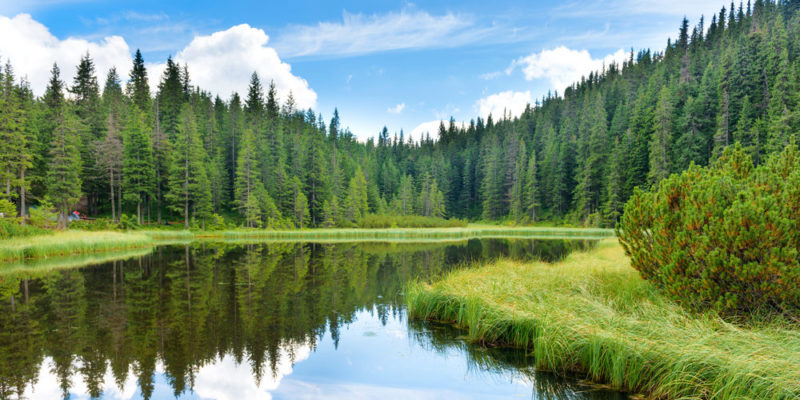We explain what the oceanic climate is, what its main characteristics are, and the subcategories into which this climate is classified.
What is the oceanic climate?
The oceanic climate also called the maritime climate or the Atlantic climate is one of the main climates within the group of temperate climates. Due to its characteristics, it is opposed to the continental climate, which is one that is not influenced by the sea, because it is well inside the continents.
The oceanic climate is found in various regions in the world, including several in Western Europe (Portugal, Spain ), the United Kingdom, Ireland, also southern Argentina and Chile and Canada, and the United States of America.
Characteristics of the oceanic climate :
Present in mid-latitudes
The oceanic climate occurs between the parallels 40 ° and 60 ° of north latitude and south latitude. In the northern hemisphere it comprises the western coast of Europe and North America, and in the southern hemisphere, the southern coast of Chile and Argentina, and the southeast coast of Australia, Tasmania, and New Zealand.
Mild temperatures
 Although there are considerable differences due to the effects of latitude, the average temperature of oceanic climates is around 10 ° C; winters are usually moderately cold (average temperature 6 to 10 ° C), and cool summers (around 20 ° C). The proximity to the sea and its thermoregulatory effect determines a rather small annual temperature range (between 10 and 12 ° C).
Although there are considerable differences due to the effects of latitude, the average temperature of oceanic climates is around 10 ° C; winters are usually moderately cold (average temperature 6 to 10 ° C), and cool summers (around 20 ° C). The proximity to the sea and its thermoregulatory effect determines a rather small annual temperature range (between 10 and 12 ° C).
Considerable rainfall
Oceanic climates are characterized by significant rainfall (which can be between 1000 and 2000 mm per year) and these are generally distributed throughout the year, although the maximum is sometimes during winter.
Flora of the oceanic climate
 The vegetation is abundant and varied. Thanks to the mild temperatures and the regular and intense rains, in areas subject to the action of the oceanic climate, forests with deciduous species often develop (those that fall in winter, to regrow the following spring), or pastures (if temperatures are not so cold).
The vegetation is abundant and varied. Thanks to the mild temperatures and the regular and intense rains, in areas subject to the action of the oceanic climate, forests with deciduous species often develop (those that fall in winter, to regrow the following spring), or pastures (if temperatures are not so cold).
Cattle raising
Regions with an oceanic climate are especially suitable for the development of livestock activities. By allowing pasture growth, these areas are ideal for raising cows and sheep.
Location
The coastal regions affected by winds from the ocean, which evaporate a lot of water, are those with oceanic climates.The following cities, among others, are characterized by being subject to this climate regime: Cuzco ( Peru ), Dublin (Ireland), London (United Kingdom), Bogotá (Colombia), Bilbao (Spain), La Coruña (Spain), Copenhagen (Denmark), Temuco (Chile).
West winds
 The oceanic climate zones correspond to coastal strips that receive humid winds from the west, which when making contact with the land give rise to persistent rains.
The oceanic climate zones correspond to coastal strips that receive humid winds from the west, which when making contact with the land give rise to persistent rains.
Mighty rivers
Due to frequent rains, rivers are mighty in oceanic climate areas, and these water levels are maintained throughout the year .
Persistent mists
Due to the high humidity levels, significant morning fogs tend to originate (especially when there are dense forests ).
Subcategories
 The Köppen climate classification, which identifies each type of climate with a series of letters that describe the behavior of temperatures and rainfall, recognizes the common oceanic climate as Cfb. But at the same time, it distinguishes other variants:
The Köppen climate classification, which identifies each type of climate with a series of letters that describe the behavior of temperatures and rainfall, recognizes the common oceanic climate as Cfb. But at the same time, it distinguishes other variants:
- Cfc - Oceanic Subpolar. It is a colder oceanic climate, which takes place in places close to the polar zones, with very little annual oscillation.
- Cwc - Oceanic subpolar with dry winter. It has less than four months of the year with an average temperature above 10 ° C (the rest of the months the average is below that value) and winters with little rainfall. It is a rare climate.
- Csb - Mediterranean Oceanic (mild summer). The average temperature of the warmest month does not reach 22 ° C, but the average is above 10 ° C for at least four months of the year. It is a transitional climate between the Mediterranean (Csa) and the oceanic (Cfb).
The above content published at Collaborative Research Group is for informational and educational purposes only and has been developed by referring to reliable sources and recommendations from technology experts. We do not have any contact with official entities nor do we intend to replace the information that they emit.
MA student of the TransAtlantic Masters program at UNC-Chapel Hill. Political Science with a focus on European Studies. Expressed ideas are open to revision. He not only covers Technical articles but also has skills in the fields of SEO, graphics, web development and coding. .
Leave a reply
Your email address will not be published. Required fields are marked *Recent post

Sport: What Is It, Types, Risks, Features, Characteristics and Examples

Dogs: Emergence, Features, Characteristics, Feeding and Breeds

Story: Definition, Elements, Structure, Features and Characteristics

